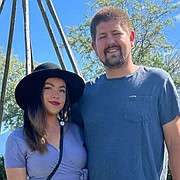Hockaday Museum hosts programs on Salish storytelling and bark baskets
The Hockaday Museum of Art next month is hosting Montana Conversations, which includes presentations on Salish storytelling and baskets, along with a basket making workshop.
Aspen and Cameron Decker will present “Sqelixʷ ‘Salish’ Storytelling ” and “A̓stqʷ: Salish Cedar Bark Baskets” on May 5-6.
The storytelling program is Friday, May 5 from 5:30- 7 p.m. and then on Saturday, May 6 from 10:30 a.m. to noon is the basket program, followed by a basket making workshop from 1-3 p.m. at the museum in Kalispell. Both presentations are free and open to the public, while a $5 donation is suggested for the workshop to cover materials.
Funding for the Montana Conversations program is provided by Humanities Montana through grants from the National Endowment for the Humanities, Montana’s Cultural Trust, and private donations.
The storytelling program incorporates Salish Language, Plains Indian Sign Language, and storytelling to discuss Salish culture, identity, and values. This presentation teaches Indigenous understandings about native storytelling, and Indigenous connection with the land.
Aspen and Cameron Decker focus on Coyote stories to teach about Salish place names/Montana geography, art, and the Salish seasonal round. As part of Salish tradition, Coyote stories are only told throughout the winter months. In the warmer months, this program focuses on Salish anthologies.
Aspen and Cameron Decker will also speak about the process of making cedar bark baskets, issues regarding making the object (environment, sustainability, culture), and what that reveals about the place we are in as contemporary Native American people. This presentation also introduces the science behind both basket making and cedar bark as a material, as well as various contemporary Native American artists who influence the work of Aspen and Cameron Decker. Together both speakers incorporate and speak Salish Language and Plains Sign Language associated with the making of the basket with students, during their program.
The basket workshop is a family-friendly, hands-on activity that is open to all ages. Participants will learn about Salish cedar bark baskets, then create replica baskets, one with clay, and the other with paint and paper. Participants will also learn Salish language and Plains Indian sign language associated with the process and materials for making the baskets. Attendance is free, however, space is limited. Pre-registration is required and forms are available at hockadaymuseum.com/workshops-classes, or email education@hockadaymuseum.com.
Aspen Decker is an enrolled member of the Confederated Salish and Kootenai Tribes and a speaker of her tribal language, Nsélišcn ‘Salish language’. She graduated with a master’s degree in linguistics from the University of Montana and earned a bachelor’s degree in Tribal Historic Preservation from Salish Kootenai College. She has a Montana Class 7 Native American Language and Culture Educator License and has taught Salish for many years. Her passion for Salish language began as a child, learning from her elders, primarily, Patlik Pierre. Who taught her about the importance of perpetuating Salish language and culture. Raising her children in the language as first language Salish speakers has been one of the ways that she honors their teachings.
Cameron Decker is Diné, an enrolled member of the Navajo Nation, and a descendant of the Confederated Salish and Kootenai tribes. He served as a faculty member at Salish Kootenai College in the fine arts department, serving as program chair of the department for four years. Cameron recently worked at the Missoula Art Museum as an educator and outreach coordinator. He holds a master’s in fine arts in integrated arts in education and is interested in ways to support our Montana education system with authentic, appropriate, and engaging lessons that teach about Indigenous values, contributions and innovations.
He and his partner Aspen have been a part of many annual teacher trainings and have been delivering presentations for the CSKT Tribal Education Department for the past five years. Together they have over 20 years combined experience in Tribal education.




